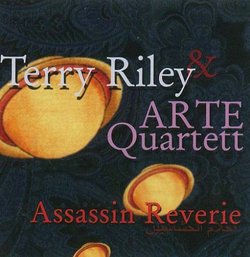One of Riley's finest
Christopher Costabile | Clearwater, FL USA | 12/12/2006
(5 out of 5 stars)
"The closest thing to "Assassin Reverie" in the Riley catalogue is "Chanting the Light of Foresight," and although that album features the fantastic Rova Saxophone Quartet, I prefer this disc, as it offers a more varied listening experience.
The album begins with Part 1 of "Uncle Jard," which is a meditative drone piece featuring Riley on harpsichord and wordless vocals. It provides an interesting introduction to Part 2 - a modal blues with Riley playing piano, accompanied brilliantly by the ARTE quartet, and singing a disturbing tale inspired by his children's imaginary friend, "Uncle Jard." Besides being a fine and moving composition in its own right, this movement of "Uncle Jard" is perhaps the most accessible and downright fun piece which Riley has ever written. It is a joy to listen to Riley howling bluesy lines like "Do you think that we've been bad?" and "Uncle Jard, he's been drinking from the devil's cup." Part 3 provides "Uncle Jard" with a necessary instrumental outro from the jubilant irreverence of Part 2.
"Assassin Reverie" is the title track and centerpiece of this album, and with good reason. The ARTE Quartet spreads out on this piece, with the saxophones building with intensity into a dense climax that features them wailing over taped sounds of destruction and war. In the liner notes, Riley describes how this composition was inspired by the disturbing realization that even assassins and terrorists are people who have dreams, hopes, and fantasies. This piece is basically an aural representation of that idea, and as one can imagine, it is haunting.
"Tread on the Trail" is by far this album's weakest asset. Although the ARTE Quartet gives a fine performance, this piece has been recorded before, and sounds merely like an interesting experiment next to the more mature compositional material.
This album is required listening for any Riley fan, and also provides a fine introduction to those who have never heard his music, as the range of styles represented here covers most of Riley's recorded output. In addition, the first two pieces are both new, and rank with some of Riley's finest compositions ever. Highly recommended."


 Track Listings (5) - Disc #1
Track Listings (5) - Disc #1